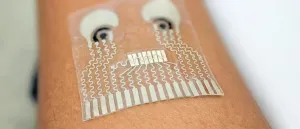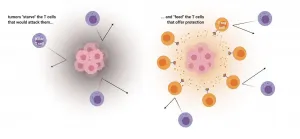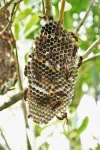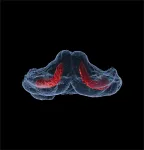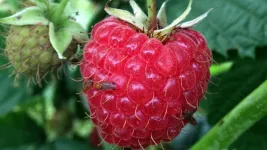New immunotherapy target discovered for malignant brain tumors
2021-02-15
(Press-News.org) Scientists say they have discovered a potential new target for immunotherapy of malignant brain tumors, which so far have resisted the ground-breaking cancer treatment based on harnessing the body's immune system. The discovery, reported in the journal END
ELSE PRESS RELEASES FROM THIS DATE:
Moiré patterns facilitate discovery of novel insulating phases
2021-02-15
RIVERSIDE, Calif. -- Materials having excess electrons are typically conductors. However, moiré patterns -- interference patterns that typically arise when one object with a repetitive pattern is placed over another with a similar pattern -- can suppress electrical conductivity, a study led by physicists at the University of California, Riverside, has found.
In the lab, the researchers overlaid a single monolayer of tungsten disulfide (WS2) on a single monolayer of tungsten diselenide (WSe2) and aligned the two layers against each other to generate large-scale moiré patterns. The atoms in both the WS2 and WSe2 layers are arranged in a two-dimensional honeycomb lattice with a periodicity, ...
New skin patch brings us closer to wearable, all-in-one health monitor
2021-02-15
Engineers at the University of California San Diego have developed a soft, stretchy skin patch that can be worn on the neck to continuously track blood pressure and heart rate while measuring the wearer's levels of glucose as well as lactate, alcohol or caffeine. It is the first wearable device that monitors cardiovascular signals and multiple biochemical levels in the human body at the same time.
"This type of wearable would be very helpful for people with underlying medical conditions to monitor their own health on a regular basis," said Lu Yin, a nanoengineering Ph.D. student at UC San Diego and co-first author of the study published Feb. 15 in Nature Biomedical Engineering. "It would also serve as a great tool for remote patient monitoring, ...
Insight about tumor microenvironment could boost cancer immunotherapy
2021-02-15
PITTSBURGH, Feb. 15, 2021 - A paper published today in Nature shows how chemicals in the areas surrounding tumors--known as the tumor microenvironment--subvert the immune system and enable cancer to evade attack. These findings suggest that an existing drug could boost cancer immunotherapy.
The study was conducted by a team of scientists at UPMC Hillman Cancer Center and the University of Pittsburgh School of Medicine, led by Greg Delgoffe, Ph.D., Pitt associate professor of immunology. By disrupting the effect of the tumor microenvironment on immune cells in mice, the researchers were able to shrink tumors, prolong survival and increase sensitivity to immunotherapy.
"The majority of people don't respond to immunotherapy," said Delgoffe. "The reason ...
Light used to detect quantum information stored in 100,000 nuclear quantum bits
2021-02-15
Researchers have found a way to use light and a single electron to communicate with a cloud of quantum bits and sense their behaviour, making it possible to detect a single quantum bit in a dense cloud.
The researchers, from the University of Cambridge, were able to inject a 'needle' of highly fragile quantum information in a 'haystack' of 100,000 nuclei. Using lasers to control an electron, the researchers could then use that electron to control the behaviour of the haystack, making it easier to find the needle. They were able to detect the 'needle' with a precision of 1.9 parts per million: high enough to detect a single quantum bit in this large ensemble.
The technique makes it possible to send highly fragile ...
Tropical paper wasps babysit for neighbours
2021-02-15
[Images and video available: see notes to editors]
Wasps provide crucial support to their extended families by babysitting at neighbouring nests, according to new research by a team of biologists from the universities of Bristol, Exeter and UCL published today [15 February] in Nature Ecology and Evolution.
The findings suggest that animals should often seek to help more distant relatives if their closest kin are less in need.
Dr Patrick Kennedy, lead author and Marie Curie research fellow in the School of Biological Sciences at the University of Bristol, said: "These wasps can act like rich family members lending a hand to their second cousins. If there's not much more you can do to help your immediate family, you can ...
Higher elevation birds sport thicker down "jackets" to survive the cold
2021-02-15
Feathers are a sleek, intricate evolutionary innovation that makes flight possible for birds, but in addition to their stiff, aerodynamic feathers used for flight, birds also keep a layer of soft, fluffy down feathers between their bodies and their outermost feathers to regulate body temperature.
Using the Smithsonian's collection of 625,000 bird specimens, Sahas Barve, a Peter Buck Fellow at the Smithsonian's National Museum of Natural History, led a new study to examine feathers across 249 species of Himalayan songbirds, finding that birds living at higher elevations have more of the fluffy down--the type of feathers humans stuff their jackets with--than birds from lower elevations. Published ...
Avian insights into human ciliopathies
2021-02-15
Ciliopathies are genetic disorders caused by defects in the structure and function of cilia, microtubule-based organelles present on the surface of almost every cell in the human body which play crucial roles in cell signalling. Ciliopathies present a wide range of often severe clinical symptoms, frequently affecting the head and face and leading to conditions such as cleft palate and micrognathia (an underdeveloped lower jaw that can impair feeding and breathing). While we understand many of the genetic causes of human ciliopathies, they are only half the story: the question remains as to why, at a cellular level, defective cilia cause developmental craniofacial abnormalities. Researchers have now discovered that ciliopathic micrognathia in an animal model results from abnormal skeletal ...
Improved use of databases could save billions of euro in health care costs
2021-02-15
Years of suffering and billions of euro in global health care costs, arising from osteoporosis-related bone fractures, could be eliminated using big data to target vulnerable patients, according to researchers at Lero, the Science Foundation Ireland Research Centre for Software.
A study of 36,590 patients who underwent bone mineral density scans in the West of Ireland between January 2000 and November 2018, found that many fractures are potentially preventable by identifying those at greatest risk before they fracture, and initiating proven, safe, low-cost effective interventions.
The multi-disciplinary study, ...
Neanderthals and Homo sapiens used identical Nubian technology
2021-02-15
Long held in a private collection, the newly analysed tooth of an approximately 9-year-old Neanderthal child marks the hominin's southernmost known range. Analysis of the associated archaeological assemblage suggests Neanderthals used Nubian Levallois technology, previously thought to be restricted to Homo sapiens.
With a high concentration of cave sites harbouring evidence of past populations and their behaviour, the Levant is a major centre for human origins research. For over a century, archaeological excavations in the Levant have produced human ...
Invasive flies prefer untouched territory when laying eggs
2021-02-15
A recent study finds that the invasive spotted wing drosophila (Drosophila suzukii) prefers to lay its eggs in places that no other spotted wing flies have visited. The finding raises questions about how the flies can tell whether a piece of fruit is virgin territory - and what that might mean for pest control.
D. suzukii is a fruit fly that is native to east Asia, but has spread rapidly across North America, South America, Africa and Europe over the past 10-15 years. The pest species prefers to lay its eggs in ripe fruit, which poses problems for fruit growers, since consumers don't want to buy infested fruit.
To avoid consumer rejection, there are extensive measures in place to avoid infestation, and to prevent infested ...


